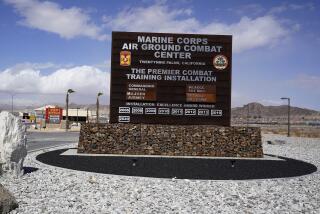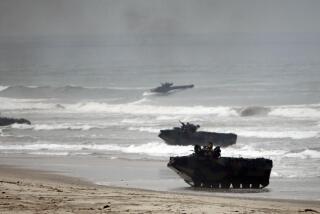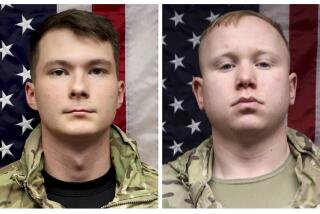Troops back from deployment more likely to cause car accidents
Members of the U.S. military — especially enlisted troops in the Army and Marines — were significantly more likely to cause auto accidents within six months of returning from deployment, according to a study by USAA Property and & Casualty Insurance Group, a major insurer for military families.
These veterans probably are engaging in survival driving habits for a war zone, such as not stopping in traffic, driving fast and making sudden, unpredictable turns, experts said. But those same driving practices create havoc back in the United States.
The insurance company looked at the driving record for each member in the study for the six months prior to deployment and then at their experience after returning to the U.S. The three-year study started in January 2007 and included 158,000 troops who had 171,000 deployments to various overseas locations.
USAA found a 13% increase in at-fault accidents for troops within the first six months of returning from deployment.
The increase in at-fault accidents was greatest for Army veterans, whose rate increased 23%, followed by Marines at 12.5%, Navy veterans at 3% and Air Force veterans at 2%.
Officers had far lower accident rates than enlisted troops, and drivers younger than 22 were more prone to crashes than older members of the military.
USAA did not detect any elevation in fatal accidents.
While it’s long been suspected that veterans returning from war zones such as Iraq and Afghanistan were more likely to be in an accident, “this finally provides some empirical information about whether this happens and what the magnitude of the increase is,” said Todd Rockwood, a professor of public health at the University of Minnesota.
Military training is part of the equation, Rockwood said.
“Things like obeying traffic signals and coming to a full and complete stop — those aren’t good in a war zone,” Rockwood said. “Moving targets are harder to hit.”
Retired U.S. Army Master Sgt. Todd Nelson knows what Rockwood is talking about. He was injured when a small car carrying explosives targeted the vehicle in which Nelson was riding in Afghanistan in 2007. Nelson lost an eye and suffered horrific burns to his head and arm requiring skin grafts.
When he returned home, Nelson found, “I didn’t like vehicles being too close to me and I didn’t like to drive the same speed as others … I didn’t want to let people merge in. That manifested itself in aggressive driving,” which he learned to control.
Bradley Hammond, who left the Army after serving in Iraq in 2006 and is now unemployed, said his wife still hates driving as a passenger in their car.
“I want to drive as close to the middle as I can because subconsciously if I see a box or some trash on the side of the road I am thinking it will explode,” said Hammond of Lakewood, Colo. “Sometimes I get a feeling someone is following me and I just turn. Something will set me off.”
Hammond said the U.S. military goes to great effort teaching troops how to drive in war zones and should do more to recondition personnel to drive normally in civilian situations when they return home.
Other research has found that veterans returning from a war zone get nervous driving near overpasses, congested areas and roadside anomalies that most drivers wouldn’t notice.
“We might see a pothole repair and think nothing of it, but they might see it as an area to avoid because it might be where an IED is buried,” Rockwood said.
Erica Stern, also at the University of Minnesota, studied the driving habits of veterans and in one survey found that 30% were told they drove dangerously after returning from deployment. Half said they become anxious when other cars approach quickly or when they get boxed in on the road, while 20% said they were anxious when driving in general.
None of the non-deployed service members Stern surveyed reported anxiety while driving.
More to Read
Inside the business of entertainment
The Wide Shot brings you news, analysis and insights on everything from streaming wars to production — and what it all means for the future.
You may occasionally receive promotional content from the Los Angeles Times.











